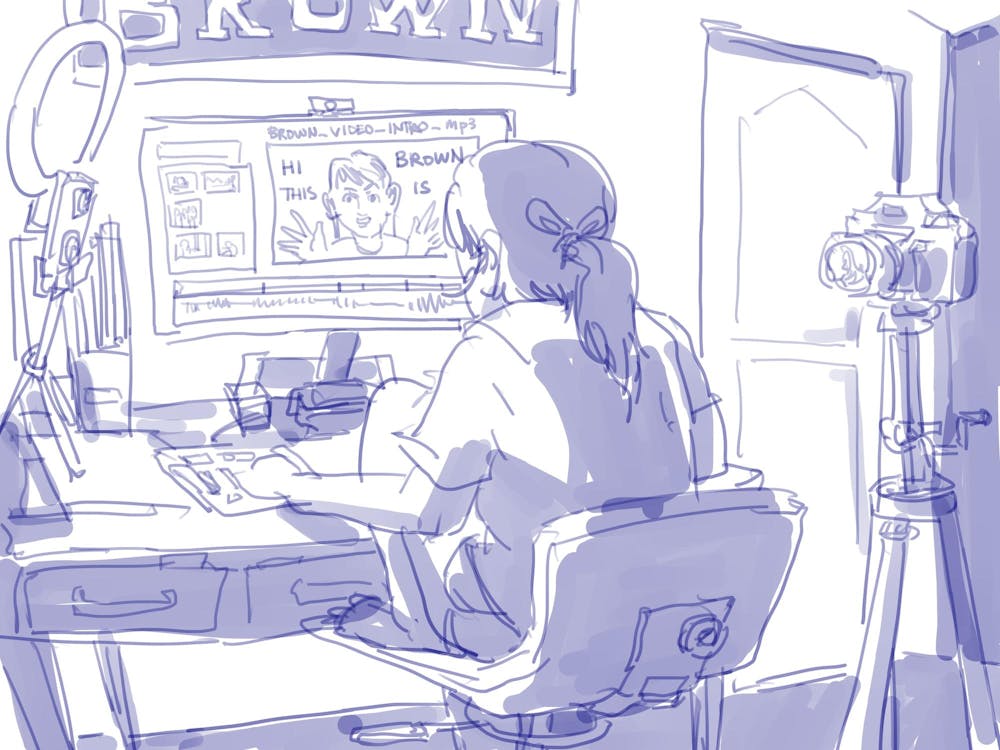Since the admissions cycle for the class of 2023, Brown has offered prospective students the opportunity to submit an optional two-minute video introduction in lieu of the in-person interviews colleges have traditionally conducted during the undergraduate admission process.
For the first few years of this program, applicants could choose between a video introduction or an alum interview. Starting in 2020, due to the COVID-19 pandemic, interviews were suspended and eventually eliminated.
“The video introduction offers us compelling insights into our applicants,” said Logan Powell, the associate provost for enrollment and dean of undergraduate admission, while reflecting on this year’s applicants. “Through their voices and their stories, we are able to understand their journeys, goals and dreams.”
Video introductions were first offered during the 2018-19 application cycle because the number of applicants requesting interviews surpassed the number of interviews alums could conduct, The Herald previously reported.
In 2020, alum interviews were suspended. Powell then told The Herald that in the 2019-20 application cycle, over 8,000 applicants asked for an interview but did not receive one. He also said that alums expressed frustration at their interviewees not eventually being admitted, a factor in eventually deciding to eliminate the interview program.
According to a poll of the class of 2027 that The Herald conducted last summer, 84% of students chose to submit video introductions. Holt Daniels ’27 was among a number of Brown students to post his video on YouTube, where it has been viewed more than 24,000 times. Daniels’s video starts with a spoken introduction, followed by his rendition of Adrianne Lenker’s “abyss kiss” overlaid on a montage of him playing guitar.
“While singing a little song and talking about what brings me joy may not sound very serious, I think it ended up going a long way because these things were further showcased later in my application,” Daniels said. In one of his application essays, he wrote about his “relationship to Adrianne Lenker’s music and how I use her calming songs as a coping mechanism to relax when I have a lot going on.”
“I hoped the admissions officer would experience the relaxation induced by the Lenker song I sang to them and be able to understand … why her music means so much to me,” he added.
Thomas Medlin ’27 said he feels that his video introduction “added authenticity” to his application. Medlin’s video follows him throughout his day as he donates blood, goes for a run, plays piano and builds Legos.
Medlin, like Daniels, chose to upload his introduction to YouTube. “I really didn't expect it to get as many views as it did,” he said. The video has since received 12,000 views.
He also used it as an opportunity to advise prospective applicants: “I left a pinned comment encouraging people to be themselves rather than attempt to make a blockbuster film that felt like bragging or an application summary.”
Eric Sherman, a college admissions counselor at IvyWise, is a “strong proponent” of the video introduction when students are given the option during applications. Washington University in St. Louis, the University of Chicago and Bowdoin College are among the other institutions offering applicants the opportunity to submit such testimonials.
When he advises students on their videos, Sherman encourages students to “be dynamic” and bring the admissions officers “into your world.”
According to David Chy ’16, interviews used to give alums “a fairly low-commitment, low-intensity way to stay involved” with the University. Chy, who first started doing alum interviews after graduating and soon became the admission office’s regional chair for New England interviews, added that he was excited by the prospect of connecting with applicants.
The interviews provided an applicant with the opportunity to “tell their own story in their own words, live and in the flesh,” he said.
But now that interviews are no longer offered, alums can connect with students after they are admitted, Chy added.
As a member of Brown’s Asian American Pacific Islander Alumni Affinity Group, he now “(reaches) out to admitted Asian American Pacific Islander students to encourage them to matriculate and/or answer any questions they might have about making a decision to attend Brown.”

Talia LeVine is a section editor covering arts and culture. They study Political Science and Visual Art with a focus on photography. In their free time, they can be found drinking copious amounts of coffee.





